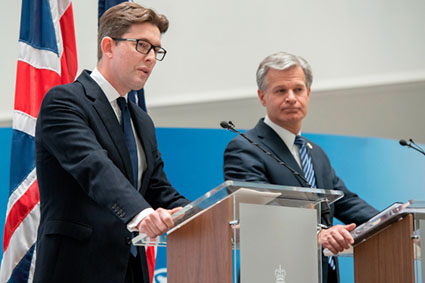Special to WorldTribune.com
The jolting but not unexpected wake-up call came from London.
In a rare and unprecedented joint press conference the chiefs of both the British MI5 domestic intelligence service and their American counterpart the Federal Bureau of Investigation, the FBI, presented a riveting account of China’s sweeping intelligence gathering operations and its wider implications for global business, cyber and military security.
FBI Director Christopher Wray warned that China’s government poses the “biggest long-term threat to our economic and national security.” He labelled the challenge as “immense.”
MI5 head Ken McCallum said that the British domestic intelligence service “had more than doubled its work against Chinese activity in the last three years and would be doubling it again.” McCallum added that, “The most game-changing challenge we face comes from the Chinese Communist Party. It’s covertly applying pressure across the globe.”

Both senior Western intel leaders were briefing a London audience of business executives and senior University figures warning that the Chinese government “was set on stealing your technology,” by employing a wide range of methods, many of which may at first not seem as espionage-related.
Ken McCallum added bluntly, “most of what is at risk from Chinese Communist Party aggression is not, so to speak, my stuff. It’s yours. The world-leading expertise, technology, research and commercial advantage developed and held by people in this room, and others like you.” He cited aerospace, engineering, cyber threats and technology transfer as comprising a particular challenge.
He advised, “The widespread Western assumption that growing prosperity within China and increasing connectivity with the West would automatically lead to greater political freedom has, I’m afraid, been shown to be plain wrong. But the Chinese Communist Party is interested in our democratic, media and legal systems. Not to emulate them, sadly, but to use them for its gain.”
Specifically citing the CCP’s United Front Work Department, a catch all bureau mobilizing seemingly unrelated multi-tiered collection efforts to gather and piece together intelligence, which McCallum described as “mounting patient, well-funded, deceptive campaigns to buy and exert influence.”
Not surprisingly the Beijing communists and many media organizations view Western espionage warnings as a form of Sino-phobia and promoting a China threat. McCallum retorted that he is focused on the activities of the Chinese Communist Party,
“We’re not talking about Chinese people, in whom there is so much to admire.” He mentioned the 150,000 Chinese students studying in UK Universities, “is, in almost all cases, good for them and good for us.”
Director Wray equally added, “it is the Chinese government and the Chinese Communist Party that pose the threat we’re focused on countering, not the Chinese people, and certainly not Chinese immigrants in our countries.”
Naturally there’s the question; Why Now? Why is such a public rebuff to the People’s Republic of China by stating the glaringly obvious?
There are multiple reasons. In East Asia, Beijing’s stifling political shutdown in the former British Crown Colony of Hong Kong presented another stark reminder as to the “trust factor” in agreements reached with the Chinese communists who legally agreed not to interfere with Hong’s Kong free political and economic system for 50 years, and then unapologetically did so.
Equally there’s the very clear and present danger posed by the Beijing regime to democratic Taiwan which again brings Beijing’s intentions into focus. FBI Director Wray warned clearly that, “if China does invade Taiwan,” Western allies could see “supply chains and relationships disrupted.” The small island remains a nexus for high tech and semiconductor technology needed globally.
For example, between 2010 and 2016, former British Prime Minister David Cameron was blissfully ambivalent to the espionage risks from massive Chinese investments; Boris Johnson was far more realistic regarding the security dimension of such commercial dealings.
A Chinese company has agreed to purchase Britain’s largest semiconductor plant, Newport Wafer Fab in Wales, which makes wafers for semiconductors. The UK government has put the $75 million microchip plant deal on hold pending approval. Currently, the United Kingdom is home to China’s largest investments in Europe with over $55 billion invested since 2000.
The Ukraine war has rocked Europe’s complacency towards authoritarian regimes and reminded Britain and the U.S. that politely tiptoeing around China’s growing intelligence gathering and military buildup does not serve our own defense and deterrence very well. Russia has China’s diplomatic and economic support in the Ukraine war.
The FBI’s Wray warned: “When you deal with a Chinese company, know you’re also dealing with the Chinese government… almost like silent partners.”
John J. Metzler is a United Nations correspondent covering diplomatic and defense issues. He is the author of Divided Dynamism the Diplomacy of Separated Nations: Germany, Korea, China (2014). [See pre-2011 Archives]
Action . . . . Intelligence . . . . Publish

 By
By